What Is Customer Experience Automation? How AI Can Help You!
If you sell online, chances are you have thousands of visitors flocking to your website every month. Managing and creating high-quality experiences for each visitor manually is not only challenging but also practically impossible. This is where Customer Experience Automation (CXA) and tools that help with CXA come into play.
Customer Experience Automation, the usage of technology to automatically manage and enhance customer interactions, has been around for over a decade with platforms helping businesses trigger actions based on data points or customer behavior. However, the landscape of CXA is rapidly evolving with the advent of machine learning and artificial intelligence (AI). These technologies are enabling businesses to scale their customer experiences like never before, ensuring interactions remain personalized, real, and valuable for customers.
Gone are the days of boring chatbots and generic messages that would frustrate customers. Today, AI-driven CXA offers hyper-personalized messaging and automation, transforming how businesses engage with their audience. AI helps in understanding customer preferences and behaviors in-depth, allowing for more meaningful and relevant interactions.
In this blog post, we will explore what Customer Experience Automation is, understand its benefits and the role AI plays in enhancing these automated processes.
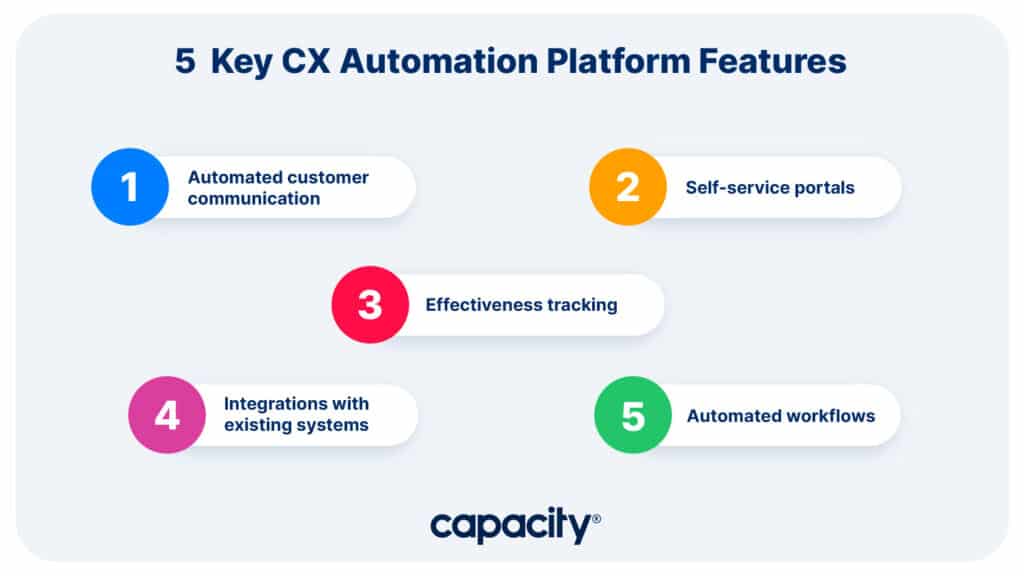
Image Source: Capacity
What is Customer Experience Automation (CXA)?
Customer Experience Automation (CXA) is the process of automating customer interactions and experiences across the entire customer journey. Unlike traditional automation that primarily focuses on marketing, CXA aims to enhance every step of the customer journey, from initial engagement to ongoing support.
By automating repetitive tasks, CXA allows businesses to handle high volumes of customers efficiently, scaling operations while minimizing human errors. Key components of CXA include automation of routine tasks, scalability, improved customer journeys, reduction of human errors, personalization at scale, and resource optimization.
Real-world applications of CXA can be seen in e-commerce with automated product recommendations and personalized email campaigns, in healthcare with appointment scheduling and patient follow-ups, in banking with streamlined customer onboarding and personalized financial advice, and in telecommunications with automated customer inquiries and service requests.
Entry of AI in Customer Experience Automation
The sudden leap in predictive modeling and generative AI has substantially increased the scope of Customer Experience Automation (CXA). For example, chatbots with specific preloaded queries have existed for decades, but they do not effectively solve all customer problems. In many scenarios, customers have specific questions that are not addressed by FAQs, leading to frustration with automated answers and a preference for human interaction. The same issue applies to automated personalizations in customer experience, as customers often have a negative attitude towards bot messages and impersonal responses that aren’t helpful to them.
Modern AI and its ability to understand context clearly and provide accurate, relevant answers or create appropriate outcomes represents a massive shift in the industry. This advancement transforms CXA into a more effective tool, enabling businesses to offer highly personalized and responsive customer service. Unlike the limited capabilities of early chatbots, modern AI can engage in complex interactions, predict customer needs, and provide solutions that are tailored to individual preferences and situations. This not only improves customer satisfaction but also reduces the need for human intervention, allowing businesses to manage higher volumes of interactions efficiently.
The integration of AI into CXA tools also enhances their adaptability, allowing them to learn and improve over time based on customer interactions. As a result, businesses leveraging AI in their CXA strategies can achieve a competitive edge, offering superior customer experiences that foster loyalty and drive growth.
Drawbacks of Traditional CXA Methods That Need To Be Solved
Traditional Customer Experience Automation (CXA) methods have some serious drawbacks, as highlighted by several examples. These limitations can hinder the effectiveness of customer interactions and lead to customer dissatisfaction. Here are some key issues with existing CXA techniques and how AI-based CXA can address them:
Rule-Based Systems
Rule-based systems rely on predefined rules and scripts to handle common customer inquiries and tasks. While they work well for straightforward and repetitive tasks, they are limited by the complexity and scope of the rules defined by programmers. These systems struggle to handle more nuanced or unexpected customer interactions, often resulting in a subpar customer experience.
Static Workflows
Traditional CXA relies on static workflows that cannot adapt dynamically to varying customer needs or behaviors. This rigidity often leads to inflexible customer interactions, causing frustration and displeasure among customers who expect more personalized and responsive service.
Limited and Often Forced Personalization
Personalization in traditional CXA is basic and typically limited to addressing customers by their names or referencing previous interactions. These attempts at personalization often feel forced and lack the depth needed to genuinely engage customers. The messaging may try to appear human but often lacks the authenticity and relevance required to be taken seriously by customers.
How AI-Based CXA Solves These Challenges
AI-driven CXA addresses the limitations of traditional methods by leveraging advanced technologies to create more adaptive, personalized, and efficient customer interactions. Here’s how AI-based CXA improves upon traditional techniques:
Adaptive and Intelligent Systems
AI-driven CXA utilizes machine learning and predictive algorithms to learn and adapt from customer interactions. These systems continuously improve their performance and accuracy over time, providing more effective and efficient service. Unlike static rule-based systems, AI systems can handle complex and varied customer inquiries dynamically.
Dynamic Workflows
Modern CXA with AI features dynamic workflows that can adjust in real-time based on customer behavior and context. This adaptability allows for more fluid and responsive customer interactions, enhancing the overall customer experience by providing timely and relevant support.
Advanced Level Personalization
AI and ML enable deep personalization by analyzing vast amounts of customer data, including behavior, preferences, and history. This allows businesses to deliver highly tailored interactions that can anticipate and meet individual customer needs. AI-driven personalization goes beyond simple name recognition, offering meaningful and contextually appropriate responses that resonate with customers.
Proactive and Predictive Capabilities
AI-powered systems can predict customer needs and proactively offer solutions. This includes anticipating issues before they arise and providing recommendations or support without customer initiation. By being proactive, AI-driven CXA enhances customer satisfaction and reduces the likelihood of issues escalating, ultimately leading to a more positive customer experience.
AI-based CXA significantly enhances the capabilities of traditional customer experience automation by providing adaptive, personalized, and proactive solutions. This evolution in CXA ensures that businesses can meet the ever-growing expectations of customers while improving operational efficiency and effectiveness.
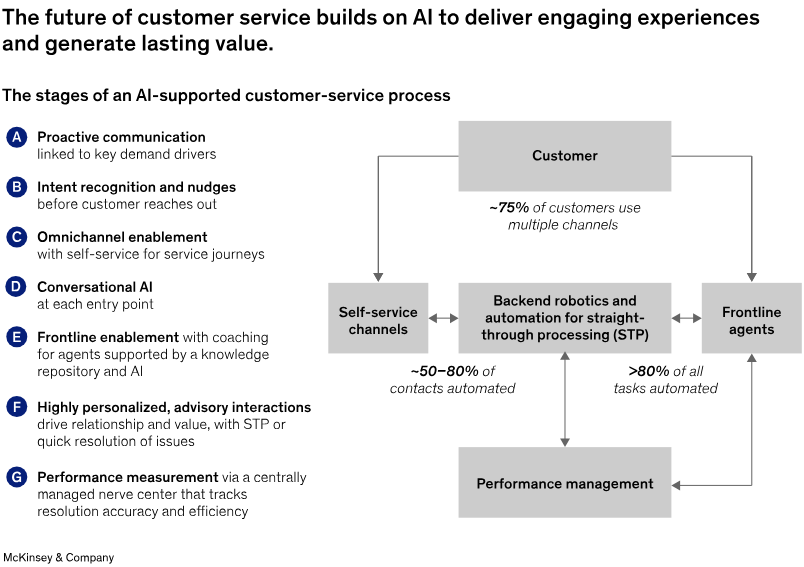
Image Source: McKinsey & Company
Case Studies on CXA
Camping World
Camping World, the leading global retailer of recreational vehicles (RVs), implemented IBM’s AI assistant to enhance their customer service operations. By automating responses for frequently asked questions, they reduced the volume of inquiries that human agents needed to handle. This allowed agents to focus on more complex customer issues, leading to a more efficient and effective service process. The AI system’s implementation resulted in a 33% increase in agent efficiency and significantly boosted customer satisfaction by providing faster and more accurate responses.
Pelago
Pelago, a travel experience platform launched by the Singapore Airlines Group, turned to Yellow.ai’s generative AI to improve their customer support and travel planning services. The AI system took over routine tasks such as itinerary planning, booking modifications, and cancellations, which previously burdened human agents. This shift allowed human agents to focus on more intricate and personalized customer inquiries. As a result, Pelago experienced a notable reduction in agent workload and an increase in user engagement. The AI-driven support provided real-time, personalized assistance, which greatly improved the overall customer experience and led to higher customer satisfaction and loyalty.
Verizon
Verizon transformed its customer experience management by integrating Pega’s AI and automation solutions. Handling over a billion transactions each month, Verizon’s AI-powered system significantly improved key performance metrics, including Net Promoter Scores (NPS) and digital contact deflections. The AI system provided efficient and personalized customer support, reducing the reliance on human agents for routine inquiries. This not only lowered operational costs but also enhanced customer satisfaction by delivering quick and precise solutions. The adoption of AI allowed Verizon to maintain high standards of customer service while efficiently managing a massive volume of interactions.
Asian Bank
A rapidly growing bank in Asia leveraged AI to address the rising number of customer complaints and enhance overall service delivery. By implementing AI-driven engagement strategies, the bank was able to proactively identify and resolve customer issues, leading to improved satisfaction rates. The AI system analyzed customer interactions and feedback, providing valuable insights that helped streamline processes and personalize services to better meet customer needs. This strategic use of AI not only improved the efficiency of the bank’s customer service operations but also strengthened customer relationships and loyalty by delivering more responsive and tailored support.
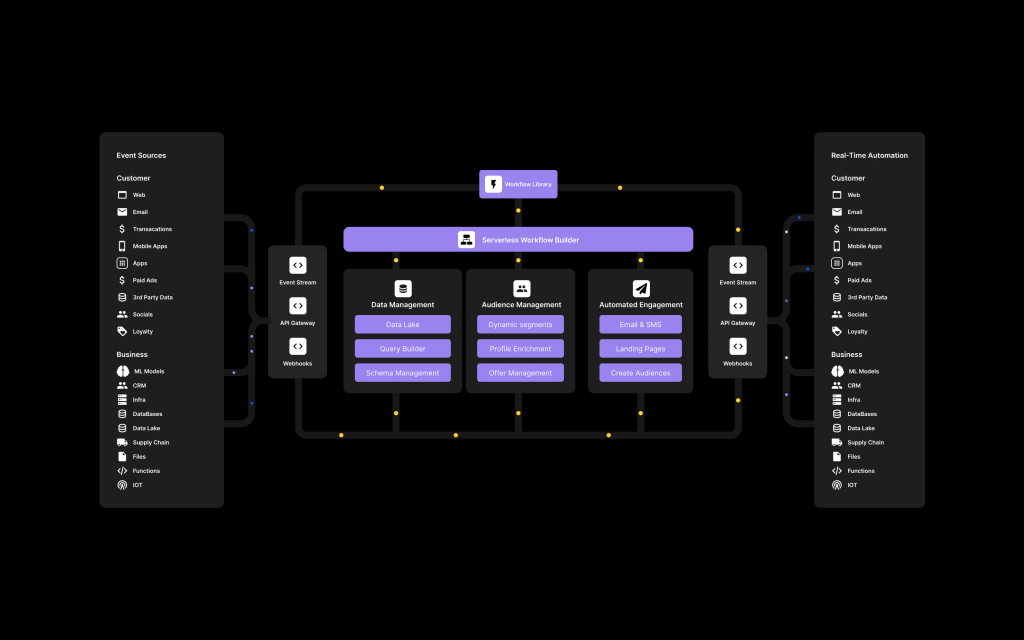
Image Source: MakerOps Inc
Different Types of CXA Platforms
Now that we understand CXA well, let’s take a look at the different types of tools you can use for your business.
Automated Customer Messaging
CXA platforms facilitate various modes of customer communications, such as chat interactions, notifications, newsletters, and more. These automated messaging systems ensure timely and consistent communication, improving customer engagement and satisfaction. Tools like Intercom, Drift, and Freshdesk provide capabilities such as live chat, bots, targeted messaging, and comprehensive customer support with automated ticketing systems.
Customer Interaction Tracking and Personalization/Prioritization
One of the critical roles of CXA platforms is to monitor how customers interact with a business’s website and campaigns. These platforms analyze customer intent and behavior to deliver personalized marketing campaigns or prioritize high-value leads. Tools like Salespanel and HubSpot Marketing Hub functionalities for tracking customer engagement, providing insights to personalize marketing efforts, and automating marketing workflows.
Workflow Automation
CXA platforms also streamline various business processes through workflow automation. This involves automating repetitive tasks, such as email responses, data entry, and follow-up reminders, which frees up time for customer service teams to focus on more complex issues. Zapier and Automate.io are popular tools for workflow automation, connecting different apps and automating tasks across multiple platforms to enhance operational efficiency.
Integration Management
Effective CXA platforms must integrate seamlessly with other business systems to ensure a unified customer experience. This includes integrating with CRM systems, email marketing tools, and other software to provide a comprehensive view of customer interactions. Tools like Zapier and Integromat play a crucial role in integration management, connecting applications, data, and devices, and creating a cohesive customer experience.
Self-Service Assistance
Self-service assistance tools empower customers to find answers and resolve issues on their own, reducing the demand on customer service teams. These tools include AI-powered chatbots, knowledge bases, and interactive FAQs. Zendesk and ServiceNow are examples of self-service assistance tools that offer robust knowledge bases, AI-powered chatbots, self-service portals, and virtual agents to help customers independently troubleshoot and find information.
So, these are the most common types of Customer Experience Automation tools that you will come across and you will need a few of these to get your jobs done. We will have a look at some tools later in the article.
Use Cases of CXA Platforms
Here are some key use cases demonstrating how these platforms are utilized in different areas to improve efficiency and customer satisfaction.
AI Chatbots and Guided Support Portal
AI chatbots are integral to modern CXA platforms, providing instant, 24/7 customer support. These chatbots can handle a wide range of queries, from simple FAQs to more complex issues. By guiding customers through troubleshooting steps and providing relevant information, chatbots reduce the workload on human agents and improve response times. Guided support portals further enhance this experience by offering interactive, step-by-step solutions tailored to individual customer needs. This combination ensures that customers receive consistent, accurate support quickly and efficiently.
Automated Ticketing and Lead Routing
Automated ticketing systems streamline the process of managing customer inquiries by automatically generating support tickets and assigning them to the appropriate department or agent. This ensures that issues are tracked, prioritized, and resolved promptly. Additionally, CXA platforms can automate lead routing by analyzing customer interactions and directing high-potential leads to the most suitable sales representatives. This targeted approach increases the likelihood of conversion and ensures that valuable leads are given the attention they deserve.
NPS, Feedback, and Review Collection
Collecting customer feedback is crucial for continuous improvement and understanding customer sentiment. CXA platforms can automate the process of gathering Net Promoter Scores (NPS), feedback, and reviews by sending out surveys and prompts at key touchpoints in the customer journey. Automated analysis of this feedback provides actionable insights, helping businesses to identify areas for improvement and enhance their overall customer experience. This ongoing feedback loop ensures that customer voices are heard and addressed effectively.
Email Marketing
Email marketing remains a powerful tool for customer engagement, and CXA platforms can significantly enhance its effectiveness. By automating email campaigns, businesses can deliver personalized content based on customer behavior and preferences. This includes welcome emails, product recommendations, and re-engagement messages, all tailored to individual customers. Automation ensures that emails are sent at optimal times, improving open and click-through rates, and ultimately driving higher engagement and conversions.
Virtual Assistance
Virtual assistants powered by AI provide another layer of support, offering more complex and personalized interactions than traditional chatbots. These assistants can perform tasks such as booking appointments, managing schedules, and providing detailed product information. They integrate seamlessly with other systems, allowing them to access customer data and provide contextually relevant assistance. This high level of service not only enhances customer satisfaction but also frees up human agents to focus on more strategic tasks.
5 CXA Platforms for 2024
Customer Experience Automation (CXA) platforms are evolving rapidly, incorporating advanced AI technologies to deliver exceptional customer service and engagement. Here are five leading CXA platforms to watch in 2024, each offering unique features and capabilities to enhance customer interactions and streamline business processes.
IBM watsonx Assistant
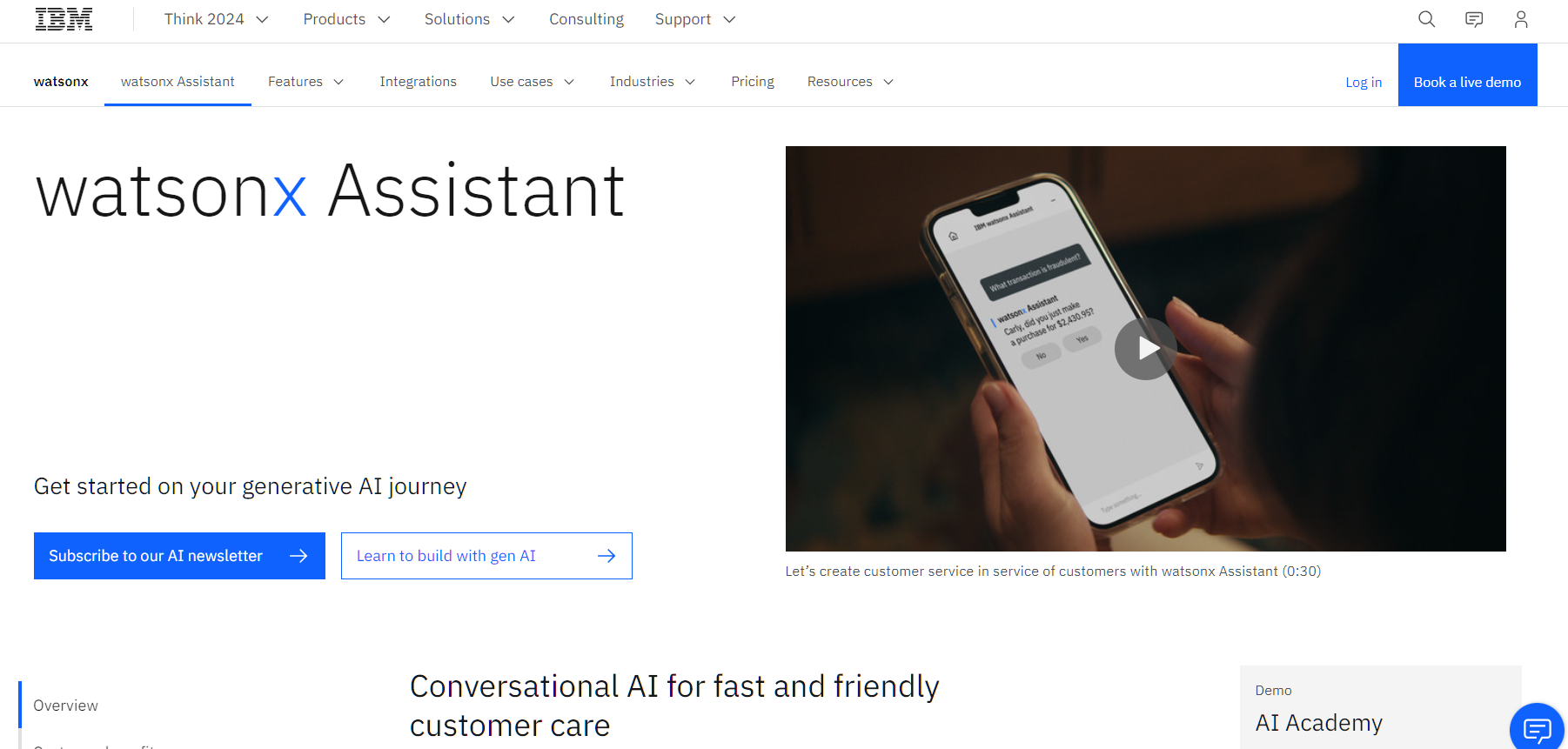
IBM watsonx Assistant is a powerful AI-driven platform designed to automate and enhance customer support. It uses advanced natural language understanding (NLU) and machine learning to provide accurate, personalized responses. Key features include AI-powered chatbots that deliver instant, context-aware responses, seamless integration with existing CRM systems, predictive analytics for proactive support, and extensive customization options. It automates responses to common queries and provides product recommendations, assisting customers throughout their purchasing journey.
Intercom
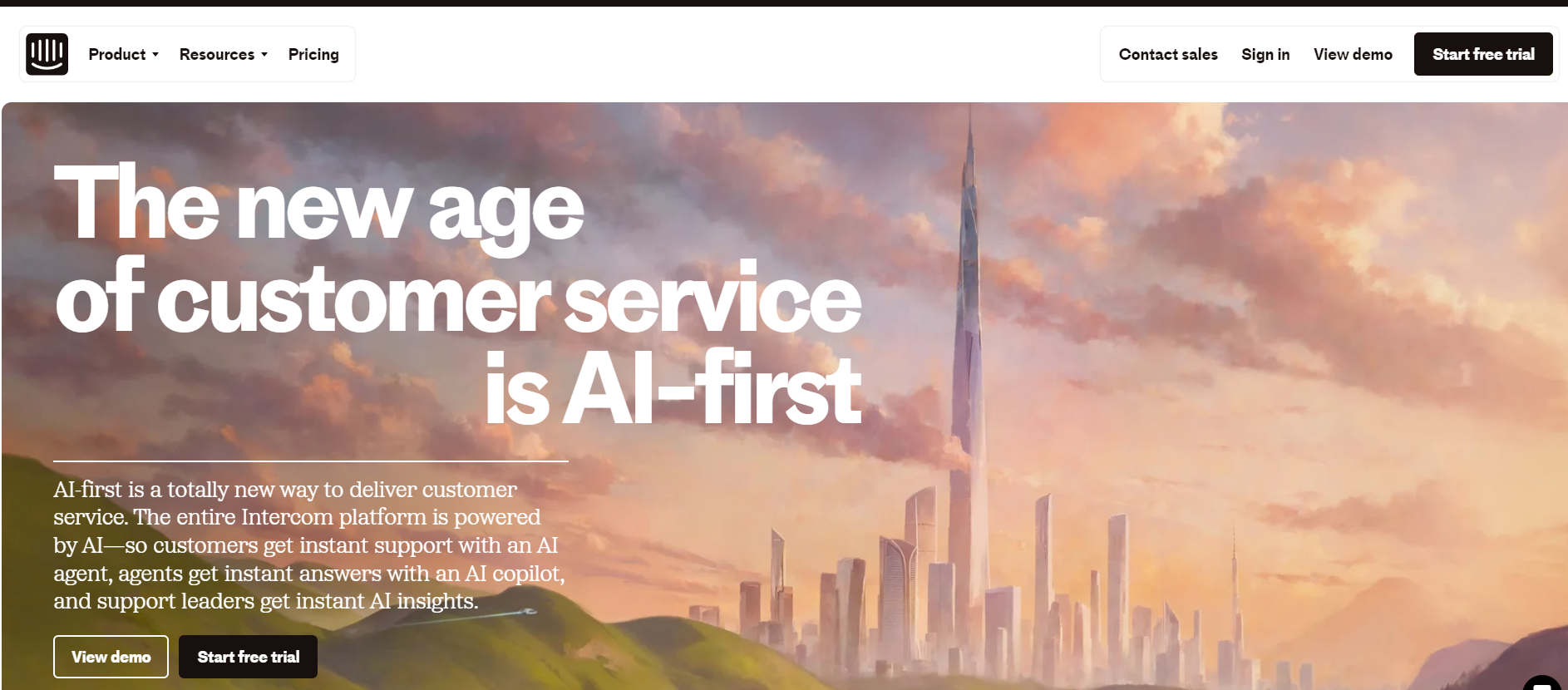
Intercom is a leading customer service platform known for its robust messaging and automation capabilities, focusing on creating personalized, real-time customer interactions through various communication channels. Its features include live chat combined with AI-powered bots, customer segmentation for targeted messaging, automated workflows to streamline repetitive tasks, and multichannel support across email, chat, and social media. It automates welcome messages and guides new users through onboarding while providing instant support and personalized engagement.
Salespanel
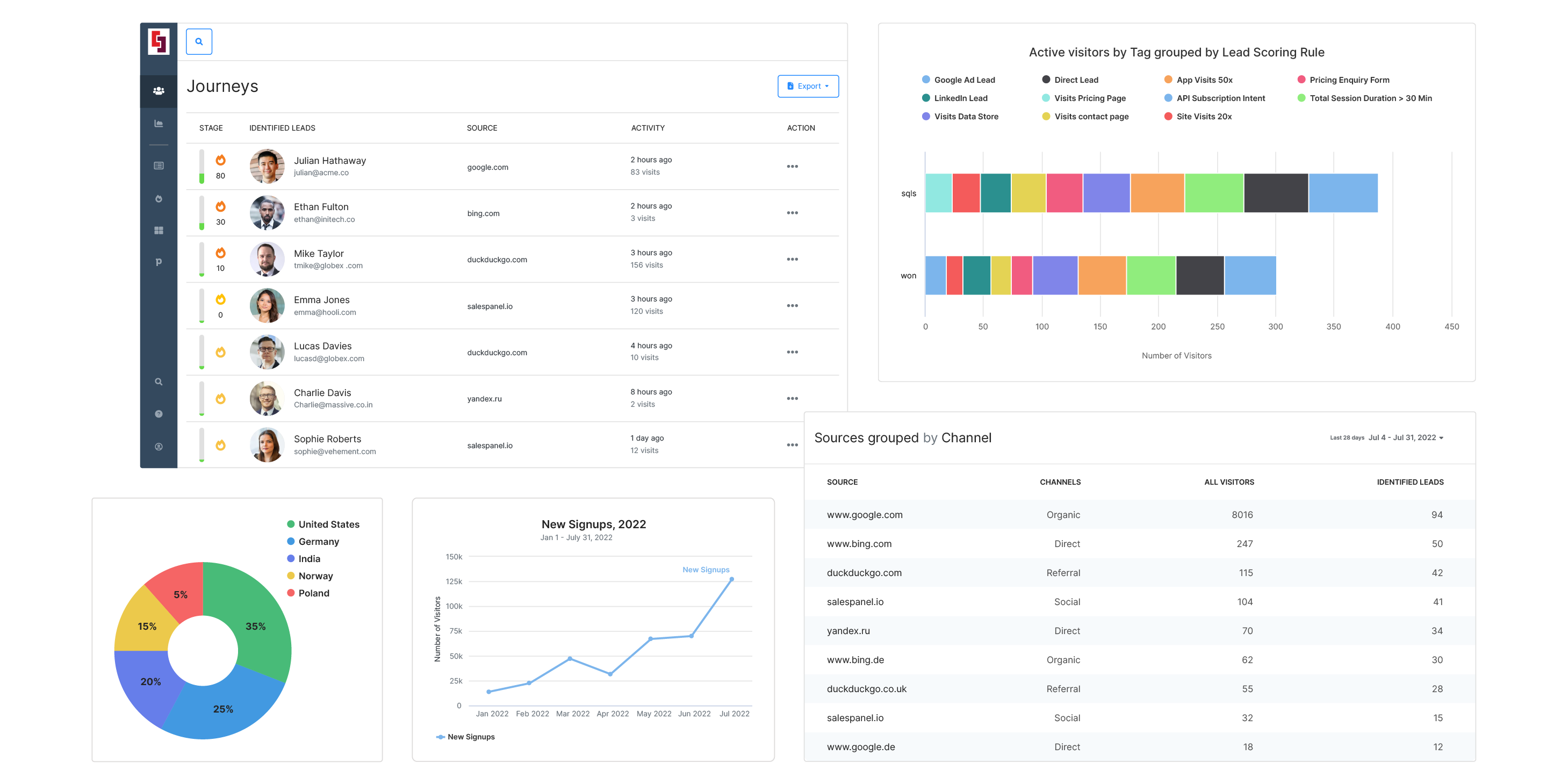
Salespanel is a customer journey tracking and lead generation platform that excels in B2B lead tracking and customer data analysis, helping businesses understand customer behavior and prioritize high-value leads. It also offers lead scoring, behavioral insights, real-time notifications and integrates with popular CRMs. For CXA, the tool is valuable for understanding buyer intent and integrating with other marketing software to automate lead nurturing process with personalized content and recommendations and helping sales teams focus on high-potential leads.
Freshdesk
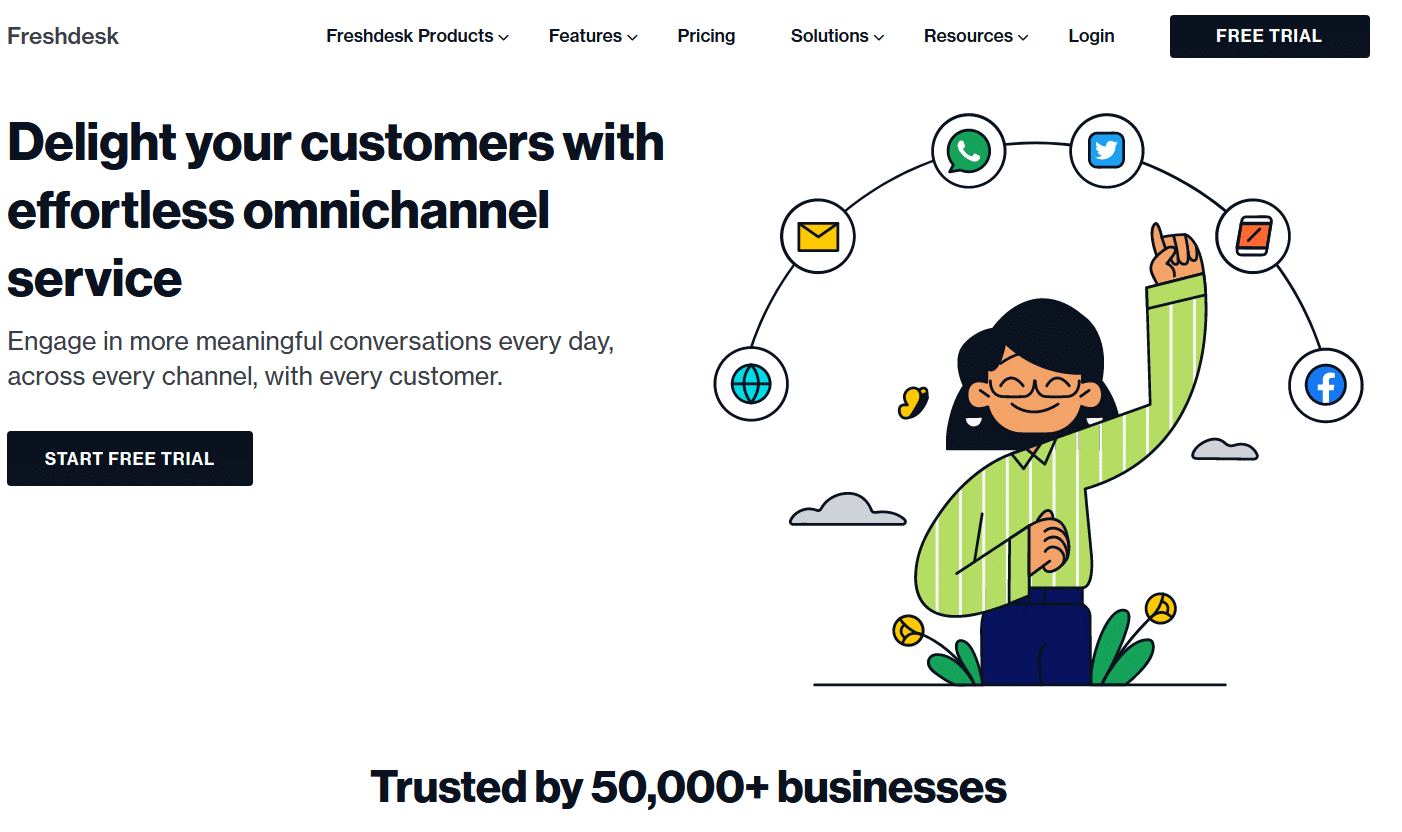
Image Courtesy – Freshdesk
Freshdesk is a comprehensive customer support platform leveraging AI to enhance customer service and streamline support operations. It features AI-powered ticketing for efficient issue resolution, omnichannel support for a unified customer experience, a robust knowledge base with AI-powered search capabilities, and collaboration tools like shared inboxes and ticket routing. It automates responses to common queries, escalates complex issues to human agents, and empowers customers to resolve issues independently through a comprehensive knowledge base.
Drift
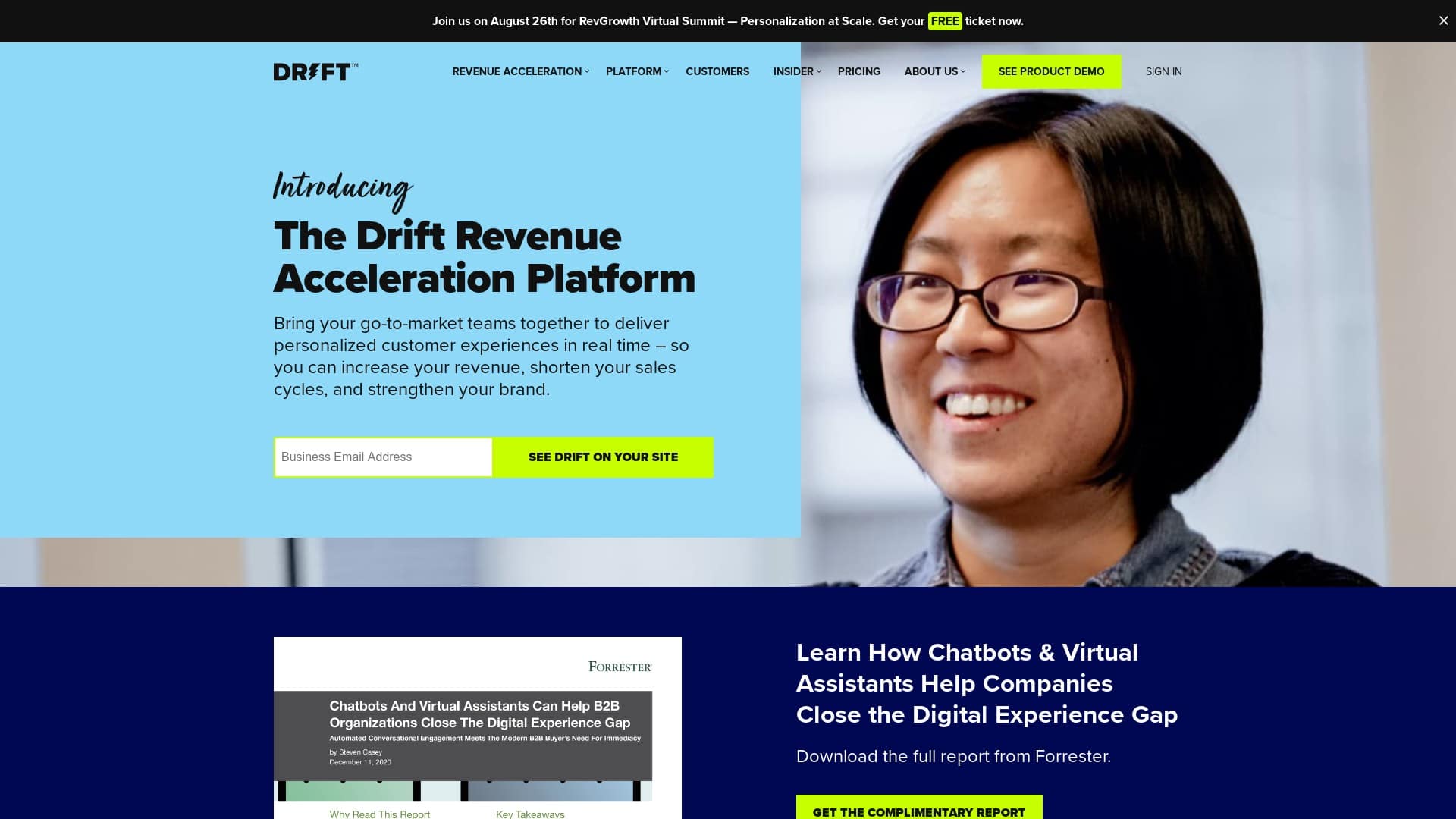
Drift is a conversational marketing platform that uses AI to create personalized, real-time customer interactions, enhancing the sales and marketing processes through automated conversations. It features conversational bots for real-time engagement, playbooks for automated workflows and personalized messaging, support for account-based marketing strategies, and detailed analytics and reporting. It captures and qualifies leads through automated conversations and enhances customer engagement with personalized interactions that guide visitors through their journey.
Capacity
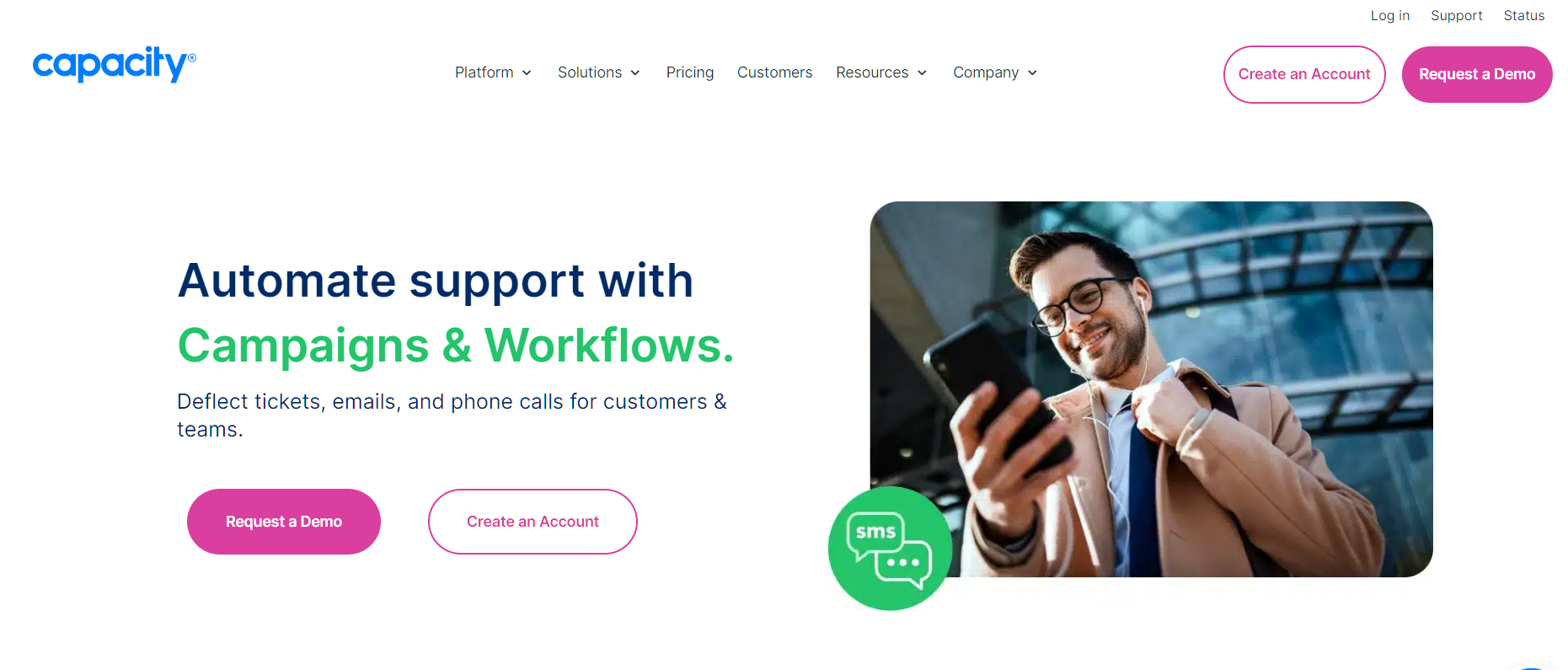
Capacity is an AI-powered CXA platform that aims to enhance customer service and support through advanced automation and intelligent assistance. It uses AI to manage a comprehensive knowledge base, automates repetitive tasks, and connects seamlessly with existing business systems for a cohesive customer experience. Its self-service portal empowers customers to find solutions independently, while its workflow automation improves efficiency, allowing teams to focus on higher-value activities. It provides instant, accurate answers to customer questions and enhances internal knowledge sharing and collaboration.
These are our top picks for CXA platforms that solve challenges and use cases we have discussed earlier. Most of these tools provide free trials so be sure to check them out!
Final Thoughts
Customer Experience Automation enhanced by artificial intelligence represents a paradigm shift in how businesses interact with their customers. By overcoming the limitations of traditional methods and delivering adaptive, personalized, and proactive experiences, AI-driven CXA offers a scalable solution for exceptional customer service.
As showcased by leading companies, integrating advanced CXA platforms can significantly improve efficiency, customer satisfaction, and loyalty. Embracing these technologies is crucial for businesses aiming to stay competitive and meet the ever-growing expectations of their customers in 2024 and beyond.
Sell more, understand your customers’ journey for free!
Sales and Marketing teams spend millions of dollars to bring visitors to your website. But do you track your customer’s journey? Do you know who buys and why?
Around 8% of your website traffic will sign up on your lead forms. What happens to the other 92% of your traffic? Can you identify your visiting accounts? Can you engage and retarget your qualified visitors even if they are not identified?


